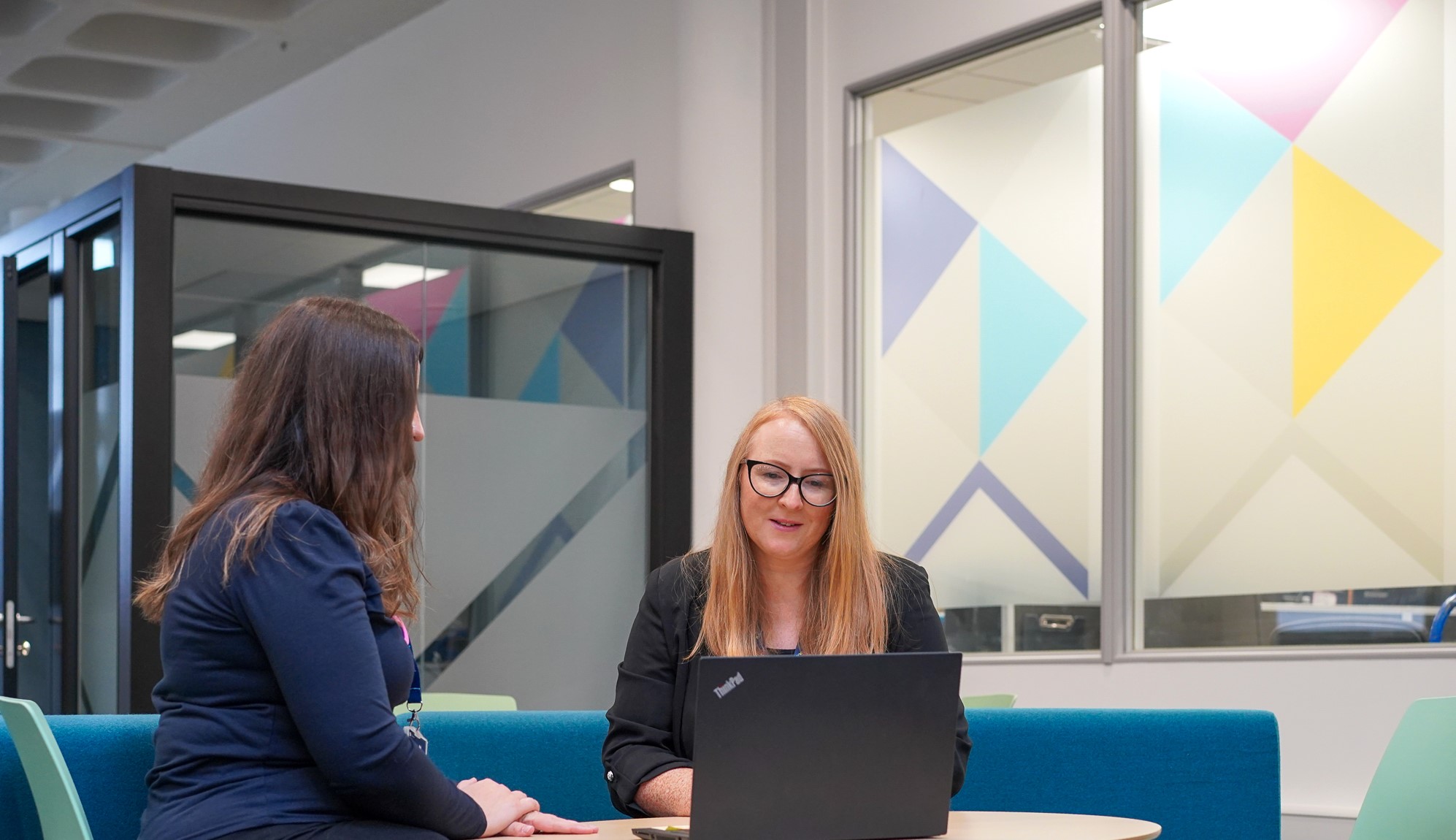
Getting started
Find out more about how to declare, developing your support plan and funded support guidance.
Types of Support
There are different types of support you may be able to access during your studies dependant upon your support need.
Some support through funding bodies such as Student Finance England, Disabled Student Allowance or NHS Bursary, will be subject to evidence and a needs/ access assessment.
To ensure full access to learning and participation, the University provides qualified British Sign Language (BSL) Interpreters to support Deaf students in their academic journey. Our interpreters are either fully registered Members of the Register of Sign Language Interpreters (MRSLI) or accredited Trainee Interpreters (TI), all adhering to the Signature (formerly CACDP) Code of Practice and the Code of Ethics for Sign Language Interpreters.
What the interpreting support includes:
-
Providing accurate, impartial interpretation between spoken English and BSL during lectures, assessments, and university interactions
-
Enabling equal access to information and communication between Deaf students and staff
-
Maintaining a neutral role — interpreters do not advise, paraphrase, or contribute beyond translating what is signed or spoken
To help ensure smooth and effective communication, we encourage students to meet with their assigned interpreter before teaching or assessment sessions whenever possible.
This service reflects our commitment to accessibility, dignity, and inclusion — empowering every student to engage fully and confidently with university life.
Language Support Tutors offer specialist, one-to-one English language support for Deaf students — including those whose first language is British Sign Language (BSL) and those who communicate orally. This tailored service is designed to strengthen language skills and empower students to thrive in their academic studies.
Areas of guidance may include:
-
Developing spelling, grammar, and proofreading strategies
-
Expanding English vocabulary and understanding of academic language
-
Planning, researching, and identifying suitable information sources
-
Breaking down tasks into clear, manageable steps
-
Structuring written assignments with clarity and coherence
-
Preparing for exams through effective revision techniques
-
Building confidence in reading and comprehension strategies
The Language Support Tutor focuses on enhancing your communication and study skills, helping you work with greater independence and confidence across your course.
For assignment-specific content and subject-related guidance, we encourage you to reach out to your course tutor directly.
Specialist mentors provide expert one-to-one support designed to empower students by helping them navigate challenges and unlock their full academic and personal potential. Support is tailored to address barriers related to specific conditions — such as mental health experiences or neurodivergent traits — in a way that is respectful, strengths-based, and growth-oriented.
Students may explore strategies and skills in areas such as:
-
Managing anxiety and stress with confidence
-
Enhancing focus and concentration
-
Building effective time management and workload prioritisation habits
-
Developing problem-solving approaches and creative thinking
-
Navigating communication in academic and personal settings
-
Cultivating assertiveness and relaxation techniques
-
Making the most of available support and resources
-
Planning proactively for future tasks and long-term goals
-
Creating a sustainable and fulfilling work-life balance
Mentoring is not about fixing limitations — it's about recognising your capabilities, amplifying your voice, and equipping you with tools to thrive in your studies and beyond.
Specialist tutors provide personalised, one-to-one academic skills support that’s grounded in understanding and built on your strengths. The focus is on helping you develop practical strategies that enhance your confidence, independence, and success throughout your studies.
Areas of support may include:
-
Building time management and organisational habits that work for you
-
Developing spelling, grammar, and proofreading techniques
-
Exploring reading and writing strategies to increase efficiency and engagement
-
Approaching planning, research, and source selection with clarity
-
Breaking down tasks into manageable, achievable steps
-
Strengthening the structure and flow of written work
-
Preparing effectively for exams and applying revision techniques
The aim is to empower you with skills that not only support academic performance, but also nurture resilience, self-awareness, and a sense of ownership over your learning journey.
As part of our commitment to accessible and equitable learning, scribe support may be offered to students through Special Examination Arrangements. A scribe (also known as an amanuensis) works alongside the student during exams or in-class assessments, providing direct transcription of dictated responses — ensuring that students can demonstrate their knowledge without barriers related to writing or typing.
What a scribe can support with:
-
Transcribing exactly what the student says, including punctuation and spelling of technical terms or names
-
Reading exam questions aloud, or reading back written responses if needed
-
Additional exam time may be included to accommodate the transcription process
Important to know: Scribes do not interpret, paraphrase, or modify the content dictated to them — their role is to write or type verbatim. To help ensure a smooth and confident experience, we strongly recommend students meet with their assigned scribe ahead of the exam for a brief practice session.
This support helps to level the playing field for students who may find it difficult to write or type under timed conditions. It's designed to uphold academic integrity while ensuring every student can participate and perform to the best of their ability.
Reasonable adjustments are input by our specialist Accessibility, disability & Inclusion advisers. They will work with you to develop a support plan.
Reasonable adjustments may include:
-
Extra time during exams
-
Adaptations to assessment formats
-
Extended deadlines for written assignments
-
Access to learning materials in alternative formats
-
Assistive technologies and equipment
- Adjustments for group work, presentations or verbal assessments
These adjustments aim to reduce barriers and enable you to participate fully in your academic experience.
Reasonable adjustments aren’t one-size-fits-all. You’ll be empowered to share what works for you and be involved in shaping your plan. Our team is here to listen, guide, and help create a pathway that works for you and also ensure support is tailored to your course.
Our specialist Accessibility, Disability & Inclusion Advisers are available to assess and support any needs related to ergonomic equipment — helping ensure your learning and assessment environments are as accessible and comfortable as possible. This might include equipment such as:
-
Supportive chairs or adjustable desks
-
Laptop stands, footrests, or back supports
-
Ergonomic keyboards and mice
-
Visual aids or specialised software for reducing strain
Whether you’re experiencing physical discomfort, recovering from injury, or living with a long-term condition, our team will work with you to identify the tools that best suit your individual circumstances. We’ll then help facilitate appropriate adjustments for both classroom and exam settings.
The University offer a range of assistive technologies.
AppsAnywhere is the portal where you will access a range of software or applications that you need for your studies, either on campus or off.
Simply log in to https://appsanywhere.wlv.ac.uk with your University user account and password from your own device at home or from a PC on campus. (On campus PCs there is a little icon on the desktop you can use too).
We also have a University Software Catalogue which provides an A-Z listing of all available software, how to get it and from where. The larger proportion of applications are available from AppsAnywhere, but it also contains applications you can download onto your device straight from the supplier.
IMPORTANT: Please be aware that the applications available in AppsAnywhere will only work on Windows devices, if you use an Apple Mac, please talk to your tutor/teacher about where you will get the software you need for your studies.


/prod01/wlvacuk/media/departments/digital-content-and-communications/images-2024/Architecture-students-tree-planting.png)
/prod01/wlvacuk/media/departments/digital-content-and-communications/images-2024/250630-SciFest-1-group-photo-resized-800x450.png)
/prod01/wlvacuk/media/departments/digital-content-and-communications/submitted-news-images/Way-youth-zone-August.JPG)
/prod01/wlvacuk/media/departments/digital-content-and-communications/images-2024/Arthi-Arunasalam-teaser.jpg)
/prod01/wlvacuk/media/departments/digital-content-and-communications/submitted-news-images/Muslim-woman-playing-football.jpg)
/prod01/wlvacuk/media/departments/digital-content-and-communications/submitted-news-images/Business-School-800x450.jpg)
/prod01/wlvacuk/media/departments/digital-content-and-communications/submitted-news-images/University-of-the-Year.jpg)





